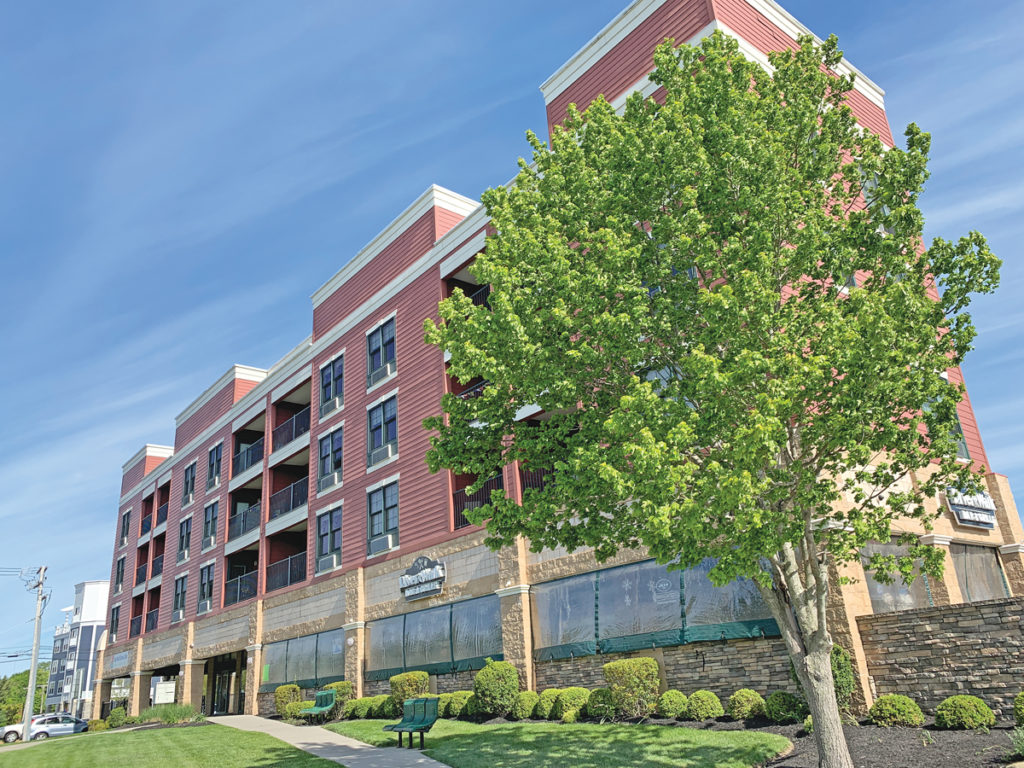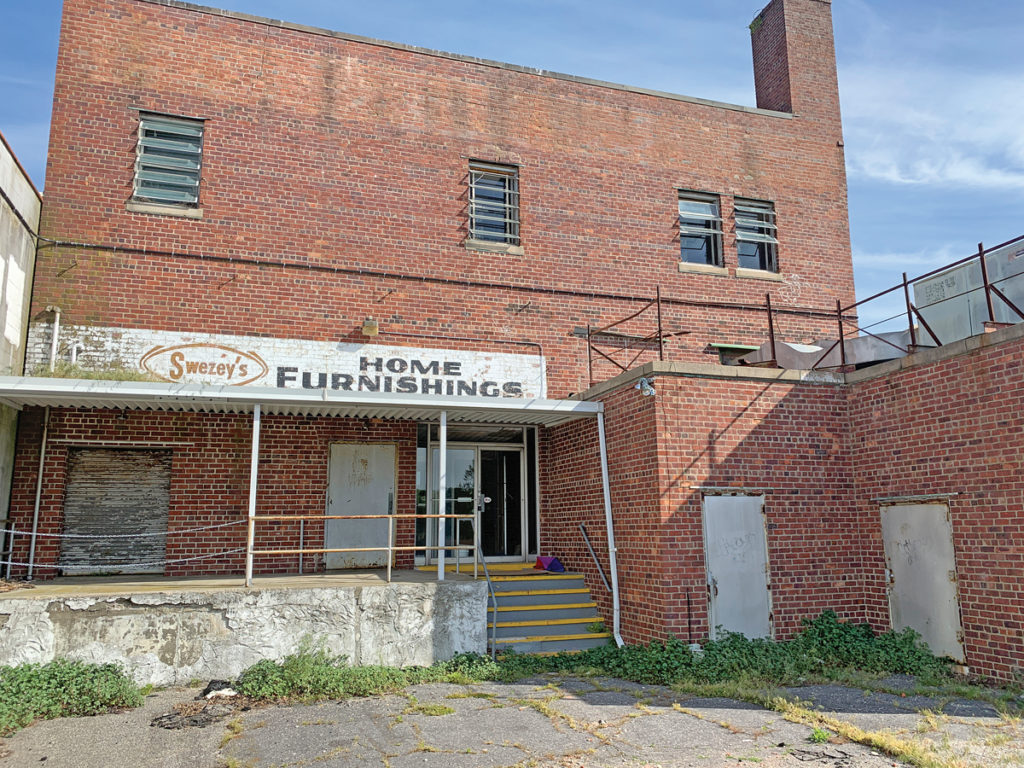The Reopen: Worries increase for downtown Riverhead as reality of recession sets in

Reporting for The New York Times in November 2003, East End journalist Tom Clavin covered the closing of the Swezey’s department store, where he described a scene with a few remaining customers and emotional employees witnessing the end of an era.
Nearly two decades later, the fall of the small chain of Long Island stores is often cited as a landmark moment in the decline of Riverhead’s downtown. It occurred at a time when redevelopment had already begun, but symbolized a major step backward in that effort.
“The Swezey’s demise may be felt most strongly in Riverhead,” Mr. Clavin wrote for The Times. “The closing deals a blow to longstanding efforts to turn the downtown area into a magnet. Paradoxically, the building that now may draw the most people to Main Street is the state unemployment office.”
Fast-forward 17 years: Swezey’s remains vacant and efforts to revitalize the downtown area persist. Progress in recent years — including growth in the local restaurant and craft beverage industries and the development of several apartment complexes that town officials and business leaders hope will bring desperately needed foot traffic to Main Street — had many as optimistic as ever about the turnaround heading into 2020.
But as Riverhead begins to assess the economic toll of COVID-19, experts project that its downtown could be among the most affected places on the East End, derailing recent advancement as unemployment rises to historic levels.
“We’re waiting for people to move to Riverhead who have money to spend to have a good experience,” said Tom Flesher, associate professor of economics at Suffolk County Community College. “That’s one of the first things to go when we’re in a recession and when we’re being careful about how we’re spending our money.”
That’s a grim prognosis for a community where several multi-story apartment buildings have opened in the last few years and several more are in the construction or planning stages. Recent history in communities like Patchogue on the South Shore suggest that those buildings would typically be filled by young working professionals who want to spend their downtime and hard-earned money at nearby restaurants and entertainment venues.
“Riverhead was following the Patchogue model,” said BNB Bank CEO Kevin O’Connor. “Things that can’t be ordered on Amazon, the service industry, obviously have dominated these downtowns.”

It’s the service industry that has led Suffolk County downtowns to a resurgence in recent years, said Mr. O’Connor, whose bank is among the leading lenders to small businesses across the East End and has funded nearly $1 billion in Paycheck Protection Program loans since March.
“Because some of the visionary politicians worked with the businesses to change the mindset,” Mr. O’Connor said.
Riverhead Town Councilwoman Jodi Giglio has been a proponent of downtown revitalization for more than a decade and is a partner in the 52-unit mixed-use Summerwind Square building near the southeast corner of Peconic Avenue and East Main Street. Ms. Giglio, who is running for New York State Assembly on the Republican line this fall, said her desire to build Summerwind, which she recalls as the “first tear-down and rebuild” in the downtown revitalization effort, led her into politics. As she assesses the current state of affairs, brought on by the fallout from COVID-19 and the ensuing shutdown orders from Gov. Andrew Cuomo, Ms. Giglio said she sees reasons to worry — even if she remains optimistic overall.
“Everyone is having a hard time paying their rent downtown and business owners are really struggling,” she said. “When I talk to them, they tell me their income has been cut to 20% of what they were making and then they get hit with another executive order [extending the shutdown].”
Ms. Giglio estimates that if the shutdown keeps small businesses closed into mid-June it’s likely we’ll see businesses close for good.
“There are many unknowns right now,” added Riverhead Business Improvement District Management Association president Steve Shauger, who is also general manager for the Hyatt Place East End Hotel downtown. “A lot of people are anxiously watching the news every day to see what regulations are put into place or what opportunities exist to reopen.”
Ms. Giglio said that experience can be painful for business owners.
“It’s like a left hook, then a right hook,” she said of the regulations being proposed and extended.
Ms. Giglio said several downtown restaurant owners have expressed concern that they might not be able to bring back employees, who are making more money on unemployment, considering the additional $600 weekly stipend being provided as part of stimulus efforts. Some of those employees are asking to work off the books or saying they’d rather stay on unemployment. Those business owners are also concerned that might affect their PPP loans, which are said to be forgiven if staffing levels are maintained.
“That needs a serious look,” Ms. Giglio said.

And it’s not just restaurants that will be affected.
“We have a very diverse downtown with all different types of businesses,” Mr. Shauger said. “Obviously, we are heavy on the hospitality industry, which has been getting hit extremely hard by this. But we do have other, varying types of businesses downtown as well.
“I hope the majority of businesses can come out this when it settles down,” he said.
Because downtown attractions like The Suffolk Theater and the Long Island Aquarium and Exhibition Center draw large crowds, they are expected to be among the last businesses to reopen based on the four-phase plan released by the governor’s office. The same can be said for the Splish Splash water park, which is several miles away, but still leads customers to downtown restaurants and hotels. Tanger Outlet Center might also remain closed for many more weeks, costing local governments a major loss of once reliable sales tax revenue.
Riverhead Chamber of Commerce president Bob Kern said he thinks the state and federal governments are operating more in a panic mode and the shutdown is greatly affecting income for would-be consumers.
“I think they are [now] realizing that unemployment has a huge effect on disposable income and that people are rightfully concerned about going out,” Mr. Kern said.
Mr. Flesher said people are also less likely to move to a new community if their income has been cut, which is sure to have an impact on construction.
Building often grinds to a halt during a recession, the associate professor said, pointing to 2009 as an example.
Mr. Shauger said it’s important that construction be placed at the forefront of any efforts to recover from a recession caused by the coronavirus pandemic.
“That is a major part of our revitalization,” he said.

Ms. Giglio said one positive is that the only project currently under construction downtown, the 116-unit Riverview Lofts, was allowed to continue during the shutdown because it involves affordable housing being built under the state’s community renewal program. She’s also optimistic that site, like the smaller building she opened in 2013, will still be able to attract tenants.
She expressed great concern, however, for projects that are currently stalled in the planning stages as portions of town government have largely ground to a halt since March.
Riverhead Town planning director Jeff Muphree said his department has received a “tremendous amount of phone calls and emails” from worried business owners and town residents during the shutdown. The planning staff has been working remotely from home since March and is even accepting new applications.
“The number one question we’re getting is what inspections are being allowed,” he said.
While Riverhead Supervisor Yvette Aguiar also stressed that the planning department is still processing all of the applications it received before the pandemic, Ms. Giglio said she’s concerned that town’s planning and zoning boards are not meeting often enough to move those projects along.
“It’s really hurting the process,” she said. “These business owners have hundreds of thousands of dollars, if not millions, out there.”
Among the projects Ms. Giglio said have stalled is another tear-down and rebuild for apartments where Subway was once located, on the south side of East Main Street, and a plan to finally redevelop the former Swezey’s building — the store that was so symbolic in the demise of downtown all those years ago — into a new home for the Long Island Science Center. That project, along with a plan to create a Town Square along the nearby Peconic Riverfront, received a combined $1.5 million in New York State economic development grants this past winter. Both plans are seen as critical next steps in downtown revitalization.
Ms. Giglio said the projects coming down the pipeline — and the determination of existing business owners — give her hope that downtown Riverhead will successfully mount its next comeback.
“I see after this a resurgence where Riverhead is going to be looked at as the downtown to go to,” she said. “Riverhead is going to be OK.”








